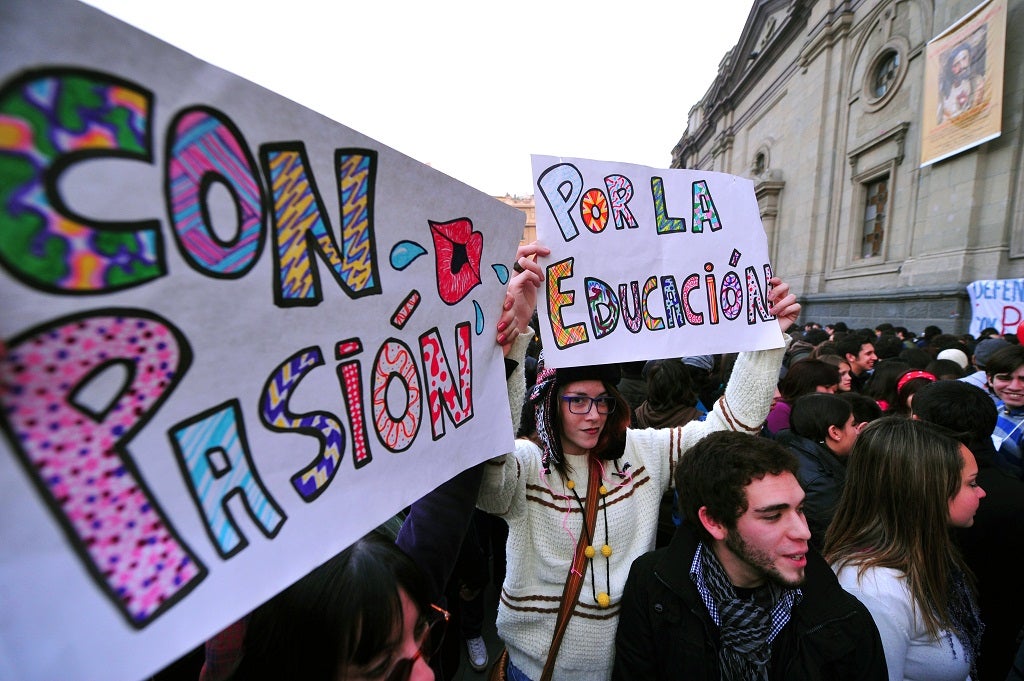Stand up, speak up: Britain's students must learn from their Chilean counterparts to bring about change in education system
In Chile students have set up their own bodies to challenge the government

If Michael Gove thinks he has a difficult job, he should spare a thought for his Chilean counterpart Harald Beyer.
Whilst the Conservative minister’s education policies have been heavily criticised, his actions, like those of his predecessors, have never been subjected to the public scrutiny of those most profoundly affected by them: the schoolchildren.
Beyer’s predicament is rather different. Over the last few years, pupils at schools throughout Santiago have been revolting, occupying classrooms and refusing to leave until their demands for radical education reforms are met.
They are angry that the system has remained largely unchanged since Pinochet introduced reforms in 1981. A third of secondary schools operate as profit making businesses with the government subsidising some private institutions through a voucher system of financing. State schools, which make up less than half of all schools in Chile, are currently funded by local councils which the students allege are neglecting to look after their basic upkeep.
Protest
Together with the university student movement the schoolchildren have generated a level of publicity which has become impossible to ignore. Last month, just three weeks after President Sebastian Piñera had announced a 9.4 per cent increase in education spending for 2013, pupils from the coordinating committee of Chile’s secondary school students (CONES) stood before a mixed congressional committee packed with government representatives, before proceeding to lecture them on their policy failures.
Bold, erudite and eloquent, 17 year old spokesperson Gabriel Gonzalez argued that structural reform, rather than merely increased spending, was necessary. “Our high schools are in utter disrepair because of their decentralisation and the abysmal nature of local council management”, he said. Gonzalez also called on the government to establish a permanent fund for free state schools rather than continue subsidising private schools which require parents to pay fees for their children to attend.
For some reason the prospect of dissident British schoolchildren publicly berating Michael Gove for his "traditional values" curriculum reforms seems almost comical. But while the problems faced by Chile’s youth are incomparable in their scope and gravity to those in the UK, the fundamental principles driving the movement are easily transferable.
The students believe education is a human right rather than a privilege, that nobody should be excluded from that right and most importantly that their suggestions for reforming the system they consider unjust should at the very least be heard by the political establishment.
In England, the task of ‘Promoting the views and best interests of children and young people’ is assigned to the Children’s Commissioner Dr Maggie Atkinson. Whilst it would be unfair to suggest that Dr Atkinson hasn’t performed a valuable function in providing young children with something approaching a political voice, events in Chile make a strong case for older secondary school pupils and sixth form students, particularly across Britain’s poorest state schools, to form their own independent bodies which can challenge those in government on their policies.
Voice
At a time when young people are increasingly accused of political apathy and a lack of interest in school, it could be fascinating to hear what they would make of Gove’s policies – from government cuts on services for the young to the disparate quality of education provided by state and private schools.
Such a development is likely to meet with fierce resistance. Last year Dr Atkinson was heavily criticised when, citing the UN convention on the Rights of the Child, she dared suggest pupils should be given more of a say on educational matters. In a Telegraph blog entitled "Children do not always know what is best for them" the conservative commentator Katherine Birbalsingh mocked the idea that Gove should “take heed” of students’ opinions on his educational policy, reminding Dr Atkinson that pupils already benefit from elected student councils which are involved in the day to day running of some schools.
However, in Chile campaigning pupils have been confronted with resistance of a much more brutal kind, with police violently breaking up their protests and regularly raiding their classrooms. British pupils could do worse than to seek inspiration from their struggle, which has been repaid in the form of a political platform and the knowledge that they have exposed as anachronistic the notion children should be seen and not heard.

Join our commenting forum
Join thought-provoking conversations, follow other Independent readers and see their replies